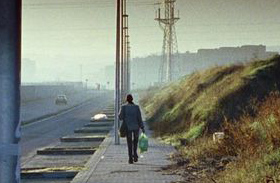It takes us by surprise and in most cases not even the ones that are closest to us are aware of its presence. When it finally decides to show its face it can leave those involved paralyzed. With the sort of long take and still camera aesthetic that allows for half of a cigarette to burn in reel/real time, writer-director Pedro Aguilera’s essay on the ills of “social violence†and mental depression is a debilitating slice-of-life portrait that easily falls into Bressonian territory. Though some slow moving portions of La Influencia can be tedious and the examination of how children react in dire circumstances is somewhat extreme, this directorial debut slotted in Cannes’ Director’s Fortnight section is stylistically accomplished, is almost cathartic in how it explores melancholy and is unsettling to say the least.
The film’s first half explores the daily toll that depression takes on the title character – a mother of two who’s mounting unpaid bills, lack of customers in her non-thriving business and a threat of eviction fail to provoke what could be regarded as a normal reaction. With no back-story and a lack of engaging dialogue to cue the viewer as to how she got to this place, Aguilera’s screenplay focalizes on giving viewers an eyeful of her mundane existence. A shower sequence in slow-motion symbolically expresses the character’s last chance at drowning the emotional and mental weight from her shoulders. A tragedy is in the making and her two children’s reactions to this fact is where the second half becomes perplexing, open to discussion and satisfyingly bizarre.
It is doubtful that Madrid doesn’t have the equivalent of a 911 emergency system, and therefore under such extraordinary circumstances it feels like a stretch that the usefulness of instant help doesn’t once cross the minds of the young children, bare in mind the oldest sibling is old enough to see over the dash board of a vehicle. While mommy’s brain is on the off-mode and her body is moments away from flat-lining, the children revel in a creative boost of energy. Aguilera perhaps includes such moments to extend the isolation discourse onto the younger players, but unlike the mother’s condition that we accept at face value, it is unfathomable to accept her offspring’s obliviousness to the situation.
Aguilera choice in using non-actors (oddly enough the on-screen family of three are also a family of three in the real world) certifies this as a work that is similar in style and aesthetic to the films where the director served as Assistant Director for Amat Escalante’s Sangre and Carlos Reygadas’ Battle in Heaven. Not without its problems, this is an impressive debut in auteurist Spanish cinema with excellent chances of finding itself in another avant-garde film festivals.
May 23rd – Cannes Film Festival: Director’s Fortnight
Runtime: 84 Minutes
